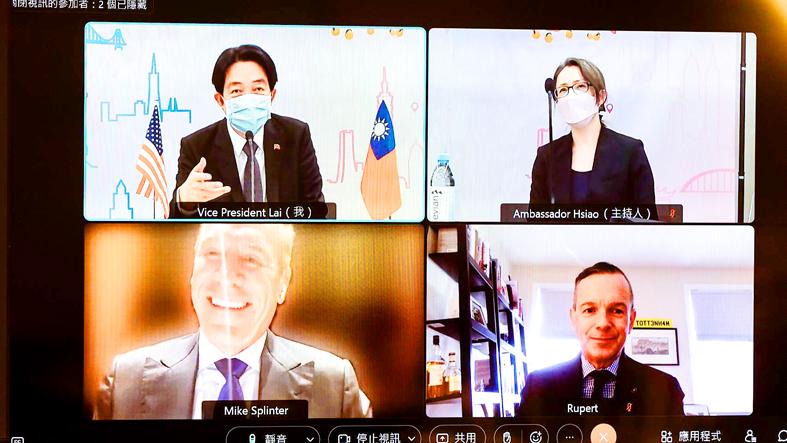Vice President William Lai (賴清德) on Saturday spoke with US Senator Tammy Duckworth by telephone and met with US experts virtually in San Francisco as he wrapped up his trip to the US and Honduras.
Lai and his delegation left San Francisco to return to Taiwan on Saturday afternoon, ending a trip that included a visit to Los Angeles for about 24 hours and to Honduras for nearly two days, to attend the inauguration of Honduran President Xiomara Castro.
In his 20-minute talk with Duckworth, Lai thanked her for her support of Taiwan and help in obtaining COVID-19 vaccines, Representative to the US Hsiao Bi-khim (蕭美琴) said.

Photo: CNA
They also discussed potential areas of cooperation for the countries, while Duckworth said that the US would not let Taiwan stand alone and expressed an interest in visiting the nation again, Hsiao said.
Duckworth, a supporter of Taiwan in the US Senate, briefly visited the nation in June last year, when she announced that the US would provide COVID-19 vaccines to Taiwan, as it struggled to obtain vaccines it had ordered.
Earlier on Saturday, Lai held virtual talks with several US experts and former officials on a range of issues.
He spoke with Yvonne Maldonado, a professor of pediatrics and health research, and Jason Wang (王智弘), a public health expert, both at Stanford University, about the spread of the Omicron variant of SARS-CoV-2 and epidemic prevention, Hsiao said.
Lai also met virtually with US-Taiwan Business Council chairman Michael Splinter and president Rupert Hammond-Chambers.
They discussed the potential for bilateral trade talks under the Trade and Investment Framework Agreement, and the hope that a Taiwan-US trade agreement could be negotiated, Hsiao said.
In another videoconference, Lai met with former US national security adviser H.R. McMaster, former deputy national security adviser Matthew Pottinger and Matt Turpin, an expert on US policy toward China at the Hoover Institution.
They discussed security issues, such as how Taiwan could enhance stability across the Taiwan Strait, and strengthen cooperation with the US and its allies to reduce its dependence on China, Hsiao said.
Lai expressed to them his confidence in Taiwan, and talked about how the nation plans to enhance its economy and make itself an indispensable part of the global supply chain, Hsiao said.
Lai’s delegation arrived in San Francisco on Friday, when he held virtual talks with the overseas Taiwanese community and US House of Representatives Speaker Nancy Pelosi.

The combined effect of the monsoon, the outer rim of Typhoon Fengshen and a low-pressure system is expected to bring significant rainfall this week to various parts of the nation, the Central Weather Administration (CWA) said. The heaviest rain is expected to occur today and tomorrow, with torrential rain expected in Keelung’s north coast, Yilan and the mountainous regions of Taipei and New Taipei City, the CWA said. Rivers could rise rapidly, and residents should stay away from riverbanks and avoid going to the mountains or engaging in water activities, it said. Scattered showers are expected today in central and

People can preregister to receive their NT$10,000 (US$325) cash distributed from the central government on Nov. 5 after President William Lai (賴清德) yesterday signed the Special Budget for Strengthening Economic, Social and National Security Resilience, the Executive Yuan told a news conference last night. The special budget, passed by the Legislative Yuan on Friday last week with a cash handout budget of NT$236 billion, was officially submitted to the Executive Yuan and the Presidential Office yesterday afternoon. People can register through the official Web site at https://10000.gov.tw to have the funds deposited into their bank accounts, withdraw the funds at automated teller

COOPERATION: Taiwan is aligning closely with US strategic objectives on various matters, including China’s rare earths restrictions, the Ministry of Foreign Affairs said Taiwan could deal with China’s tightened export controls on rare earth metals by turning to “urban mining,” a researcher said yesterday. Rare earth metals, which are used in semiconductors and other electronic components, could be recovered from industrial or electronic waste to reduce reliance on imports, National Cheng Kung University Department of Resources Engineering professor Lee Cheng-han (李政翰) said. Despite their name, rare earth elements are not actually rare — their abundance in the Earth’s crust is relatively high, but they are dispersed, making extraction and refining energy-intensive and environmentally damaging, he said, adding that many countries have opted to

PEACE AND STABILITY: Maintaining the cross-strait ‘status quo’ has long been the government’s position, the Ministry of Foreign Affairs said Taiwan is committed to maintaining the cross-strait “status quo” and seeks no escalation of tensions, the Ministry of Foreign Affairs (MOFA) said yesterday, rebutting a Time magazine opinion piece that described President William Lai (賴清德) as a “reckless leader.” The article, titled “The US Must Beware of Taiwan’s Reckless Leader,” was written by Lyle Goldstein, director of the Asia Program at the Washington-based Defense Priorities think tank. Goldstein wrote that Taiwan is “the world’s most dangerous flashpoint” amid ongoing conflicts in the Middle East and Russia’s invasion of Ukraine. He said that the situation in the Taiwan Strait has become less stable